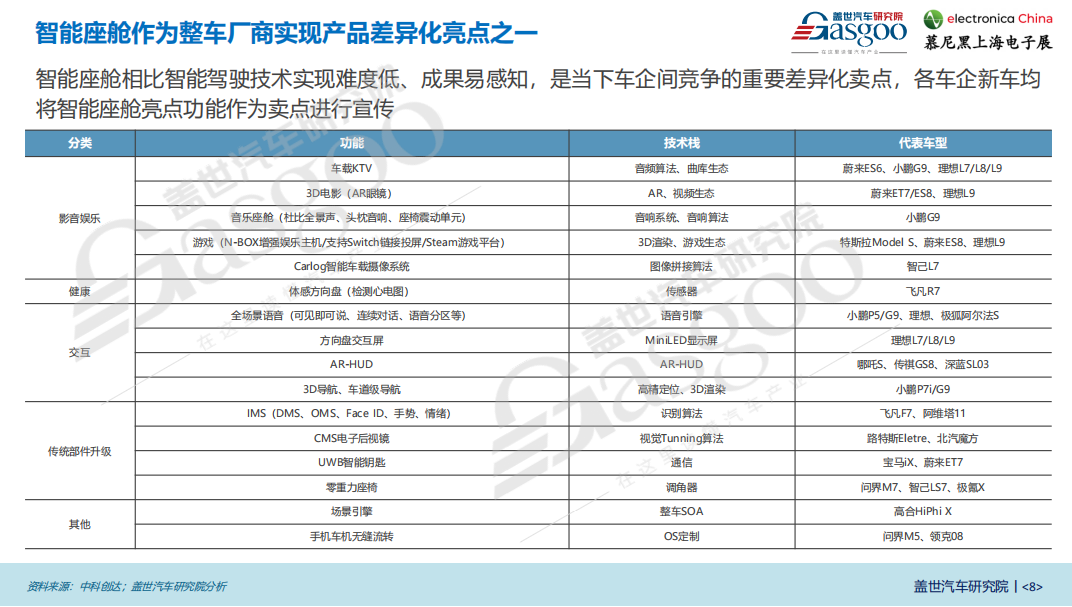Gasgoo Awards: Most Growth Value Award for 2023
The emergence of electrification and smart technology has not only opened up new horizons for the automotive industry but is also reshaping the global automotive supply chain.
For a considerable period, foreign companies dominated the global automotive supply chain. However, the development of smart electric vehicles has enabled local Chinese companies to take the lead. This shift includes not just traditional Tier 1 suppliers but also innovative companies with new technologies, ideas, and business models, all seizing this historic opportunity to explore more possibilities for the transformation of smart electric vehicles.
This year, the 5th Gasgoo Awards introduced the "Most Growth Value Award" to identify innovative companies with high growth potential amidst the ongoing transformation. The selection process, initiated in May, took several months, involving participation from nearly a million people through online voting and expert evaluations. The results have been officially unveiled, with 55 outstanding companies making the list, spanning various core technology domains like intelligent cockpit, intelligent driving, intelligent chassis, chip, software, AI, powertrain electrification, thermal management, body and interior & exterior, and low-carbon new materials.

As both the Chinese and global automotive industry transition towards electrification, the race for smart technology is in full swing, recognized as the decisive factor in the next automotive revolution. Intelligent driving and smart cabins, the two core components of intelligent vehicles, have become central elements in the differentiation strategies of automakers.
According to recent data from the Gasgoo Auto Research Institute (GARI), in 2022, the penetration rate of L2 autonomous driving functions on vehicles exceeded 30% in China. This figure further increased to 40% in the first half of 2023, marking a rise of 10 percentage points from the same period last year. In terms of application scenarios, after the successful application of the highway NOA (Navigate on Autopilot) function last year, urban NOA has also witnessed a significant breakthrough this year.
Overall, the demand for L2 and L2++ ADAS (Advanced Driver Assistance Systems) is evident in both passenger and commercial vehicles. There is a growing need for various advanced driving assistance functions, and higher-level autonomous driving products and features continue to improve. Especially in the case of commercial vehicles, in certain closed and specialized scenarios, commercialization of L4 autonomous driving technology has already begun.
The GARI predicts that by 2025, the penetration rate of L2 autonomous driving functions in China will further reach 45%, with the start of large-scale production of vehicles enabled with L3 functions.
The rapid development of autonomous driving is transforming cars from simple transportation tools into mobile third living spaces. The demand for safer, smarter, more efficient, entertaining, and perceptible in-car experiences has given rise to a plethora of human-machine interactions (HMI), connected services, and scenario applications.

For instance, in the realm of audiovisual infotainment, features like in-car Karaoke, 3D movies, music cabins, and gaming cabins are becoming increasingly common in new vehicles. HMI has evolved from simple knobs and touch interfaces to multi-modal interactions, including voice recognition, fingerprint scanning, gestures, and facial recognition, leading to the integration of technologies such as steering wheel interaction, AR-HUD (Augmented-Reality Head-Up Display), and 3D navigation.
Moreover, traditional components like rearview mirrors, car keys, and seats have evolved into CMS (Camera Monitor System) electronic rearview mirrors, UWB (Ultra-Wideband) smart keys, zero-gravity seats, and intelligent surfaces as part of the smart technology upgrade.
If we were to classify smart cabins according to different levels of smart technology, the current state of smart cabins mostly aligns with L2, featuring active perception and execution capabilities in specific scenarios, with the ability to sustain cloud services. On this foundation, L3 advanced cognitive smart cabins are expected to enter the market around 2025.
Looking at the overall penetration rate, according to the GARI, the overall penetration rate of "smart cabins," defined as those with four core functions such as a central control screen larger than 8 inches, voice interaction, V2X, and OTA updates, has already exceeded 50% in China. With the increase in young car buyers, smart cabins are set to see further development.
The rapid proliferation of intelligent driving and smart cabin technologies not only imposes higher demands on sensors, domain controllers, computing platforms, hardware, software, and system solutions but also creates new market hotspots across the entire supply chain.
Currently, standard L2 autonomous driving typically requires computing power of no more than 30 TOPS. However, as advanced driving applications expand towards highway and urban NOA capabilities, the scale of data processing increases exponentially, demanding over a hundred TOPS of computing power.
Furthermore, as higher-level autonomous driving is gradually applied, cabin intelligence continues to advance. This leads to increased requirements for chips, algorithms, and performance, pushing multi-core SoCs (System-on-Chips) to become the mainstream control chips for future smart cabins.
The rise of AI large models is redefining automobiles and offering more possibilities for the development of intelligent vehicles. In line with these trends, more automakers and technology providers are increasing their investments in the field of intelligent technology, accelerating the rise of the local intelligent driving supply chain and the rapid growth of innovative forces in the automotive industry.

With the motto of "discovering good companies, promoting advanced technologies, and commending automotive innovators," the 55 companies recognized in this year's Gasgoo Awards, particularly the 22 companies in the intelligent driving sector, have covered various core domains, including autonomous driving, commercial vehicle intelligent driving, domain control, chassis-by-wire, sensors, and high-precision positioning. Winners in the cabin technology sector totaled 7 companies, with products spanning AR-HUD, onboard camera, and CMS. Meanwhile, 13 companies were selected in the software realm, which encompasses integrated software & hardware solution, intelligent driving software, operating systems, etc. Moreover, 12 chip-related players and 1 electric vehicle charging solutions developer were also on the list.
The rapid rise of local supply chains
The wave of transformation in intelligent electric vehicles is reshaping core automotive technologies in China. A new supply chain system is rapidly emerging and maturing to meet the ever-evolving needs of intelligent electric vehicles. The awarded companies have become leaders in their respective fields.
In the field of autonomous driving, numerous companies such as QCraft, Inceptio Technology, Zhito Technology, and Plus, have made it to the list, with a focus on applications for commercial vehicles.
Unmanned driving represents the ultimate goal of autonomous driving applications, with commercial vehicles leading the way due to their relatively simpler operating scenarios. In fact, several L4 companies have focused on specific scenarios such as airports, ports, mines, and industrial parks and have successfully implemented advanced autonomous driving applications, providing significant business returns. As these technologies mature, a transition to passenger vehicles is expected in the future.
At the current stage, passenger vehicles have achieved large-scale implementation of L2 autonomous driving functions, while the commercialization of L3 and above autonomous driving solutions awaits additional support in the form of policies, regulations, technology, ethics, and other factors.
The rapid adoption of intelligent driving heavily relies on core technologies such as LiDAR and millimeter-wave radar. LiDAR has already achieved large-scale applications over the past two years. According to the latest statistics from the China Academy of Information and Communications Technology (CAICT), as of the third quarter of 2023, 36 Chinese automakers have announced the use of LiDAR, with up to 106 vehicle models expected to be equipped with LiDAR, accounting for nearly 90% of the total number of new models featuring LiDAR globally. This transformation has given rise to a group of leading companies in the LiDAR field.
Notably, millimeter-wave radar, an evolving technology, is poised to be the next big thing after LiDAR. Companies like G-PAL, MuNiu Tech, Chuhang Technology, and Nova Electronics flex their abilities in this category.
In a complete autonomous driving process, precise positioning is a crucial element. As ADAS functions become increasingly standard in new vehicles and scenarios grow more complex, the prospects of high-precision positioning services in the automotive industry have expanded. Historically, high-precision positioning has been monopolized by foreign companies due to high R&D thresholds and the complexity of development. However, in recent years, leveraging the domestic market, BeiDou navigation technology, self-developed chips, and multi-source fusion algorithms, China has seen the emergence of companies dedicated to high-precision positioning. Recognized companies like DAYOUPi, Bynav Technology, and CX Robot Connect have made significant strides and have even achieved mass production.
As the evolution of electrical and electronic architectures enters a stage of cross-domain integration, cockpit integration, driven by the synergy between software and hardware, is becoming the main development path. This has created a growing demand for differentiation and customization. Due to early technology exploration, Chinese OEMs have developed faster compared to foreign counterparts, showcasing a distinct competitive advantage. Award-winning companies in the smart domain control sector include Technomous and Eco EV.
Regarding smart cabins, according to data from the GARI, in the first half of 2023, the penetration rates of central control screens, in-car voice interactions, and V2X all exceeded 70%. Technologies like domain control, HUD (heads-up displays), CMS, and DMS (driver monitoring systems) are increasingly becoming standard features on new vehicles priced around 200,000 yuan.
Suppliers in relevant areas are also benefiting from this trend. Companies such as Raythink, FervCloud, Jiangcheng Technology, and AISpeech in the HUD sector, Kankan Tech in the field of in-car cameras, Autocruis in CMS, and Thunderstone in the realm of in-car Karaoke have all earned their place in this year's Most Growth Value Awards.

Apart from emerging components, the transformation of vehicle intelligence has led to the restructuring of the fundamental capabilities of automobiles. In the era of software-defined vehicles, in-car software is becoming the primary driver of innovation and application expansion in the automotive industry. According to relevant analysis, software will account for 90% of automotive innovation in the future. This vast development space has inspired a host of local players in the market.
The awards in the software field span various subdomains, including core operating system kernels, middleware, simulation testing, high-performance intelligent driving software computing platforms, and others. Recognized companies include Sonatus, JDO, Rivotek Technology, Enjoy Move, and Zlingsmart Technology, to name a few.
In the realm of chips, after experiencing a semiconductor shortage crisis in the past two years, domestic chip manufacturers are consciously accelerating the replacement of imported chips in various domains, including automotive-grade MCUs, power chips, automotive MEMS sensors, and automotive-grade analog-digital mixed-signal chips. With the industry chain reform in full swing, local companies are making steady progress. Companies like AutoChips, YTMicro, Spintrol, HUAV, FineMEMS, Indie Microelectronics, SemiMent, and others have secured their place thanks to their strong capabilities.
Furthermore, as the limit of high computing power continues to expand, cross-domain integration has become the focus of competition in automotive computing chips. In addition to traditional chip giants, local chip companies have also shown significant development. Companies like Houmo.ai, Oritek, and NOVAUTO have demonstrated the ability to evolve upward. In May of this year, Houmo.ai introduced the industry's first all-in-one intelligent driving chip, the Houmo Hongtu H30, capable of delivering up to 256 TOPS of physical computing power while consuming no more than 35W of power.
The development of electric and intelligent vehicles has also led to the intelligent transformation of core structural components such as chassis, which includes steer-by-wire, brake-by-wire, and suspension-by-wire. However, due to a later start, the chassis market in China was initially dominated by traditional Tier 1 suppliers like Bosch. The rapid development of smart electric vehicles has prompted domestic suppliers to catch up. Awarded companies like LEEKR Technology and BWI Group are on the rise.

"Overall, the development of China's autonomous driving supply chain is advancing rapidly and relatively well-established, with an increasing capability for software algorithm generalization," stated Gasgoo CEO, Tina Zhou, recently.

In conclusion, the Chinese automotive industry is experiencing significant internal competition in 2023, with hundreds of suppliers engaged in fierce battles, either emerging victorious or being eliminated in rounds of competition. The rising "new stars" born from this environment have become an undeniable force, reshaping the competitive landscape of the industry.
In this process, China's intelligent automotive industry is undeniably expanding and strengthening its foothold.
Gasgoo not only offers timely news and profound insight about China auto industry, but also help with business connection and expansion for suppliers and purchasers via multiple channels and methods. Buyer service: buyer-support@gasgoo.com Seller Service: seller-support@gasgoo.com
All Rights Reserved. Do not reproduce, copy and use the editorial content without permission. Contact us: autonews@gasgoo.com.